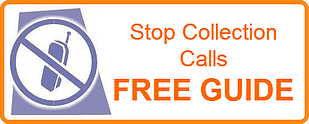If you are delinquent in paying your debts, a creditor can decide to pursue all legal avenues including wage garnishment.
But before you panic, understand that a creditor cannot garnish your wages just because you are behind on credit card or other unsecured debts!
Before they can apply for a WRIT OF GARNISHMENT, a creditor will:
- Contact you in writing or by phone in an attempt to collect the debt and/or work out a repayment plan.
- If the creditor's collections efforts are unsuccessful, they will turn the account over to a collection agency. This collection agency will also contact you in writing and by phone to collect the debt. In fact, they will most likely call you multiple times a day at all hours. You do not have to put up with this. To learn what collectors can and can't do read more about Fair Debt Collection Practices.
- If the collection agency's attempts to collect the debt are unsuccessful, they may decide to retain a local attorney to file a claim. If they are a ATTORNEY/COLLECTION FIRM, they will file the claim themselves.
- If this happens, you will receive a SUMMONS and it will basically state that you have 20 or 30 days (States vary as to how long you have) to "ANSWER" the claim. An "ANSWER" is you response to the claim if you feel that YOU DO NOT OWE THE DEBT CLAIMED IN THE SUMMONS.
- It usually takes about 45-60 days before a court date is set. NO, YOU DO NOT HAVE TO GO TO COURT. This is just a formal hearing to award the judgment to the plaintiff (creditor) by default. Default meaning that you did not dispute the claim.
- With the DEFAULT JUDGMENT, the creditor can now apply for a writ of garnishment.
What happens once your creditor is awarded a Writ of Garnishment?
In most cases, an agreement not to pursue wage garnishment can be negotiated (if you act quickly).
A STIPULATED AGREEMENT would state that you will make a payment every month until either the full amount or a slightly reduced amount is repaid.
Depending on your state of residency, there may be an interest rate limit(Oregon is 9%, Washington is 12%). Be sure to check your state's limit.
As long as you make your payments on time, the creditor will not act on the wage garnishment.
What types of income are exempt from Wage Garnishment?
The following types of income are exempt from wage garnishment:
- Social Security benefits
- Supplemental Security Income (SSI)
- Welfare or public assistance
- Spousal support or child support
- Public or private pensions
- Veterans benefits and/or loans
- Disability proceeds of life insurance policies
- Cash surrender value of life insurance policies
- and many others
There are also exemptions and limits as to the calculation final amount of wage garnishment. We have found that most employers are unaware of these exemptions and limitations, so make sure you know your rights!
In Oregon for example, if you earn below a certain amount, you may be fully exempt from wage garnishment! Click her to find out more!
Finally, if all of this seems a "little too much for you to handle", we can help. One of our Debt Solutions Specialists can help you decide what is the best next step for you. Give us a call at 1-877-492-4109 or simply click on the link below for a free debt elimination consultation.







